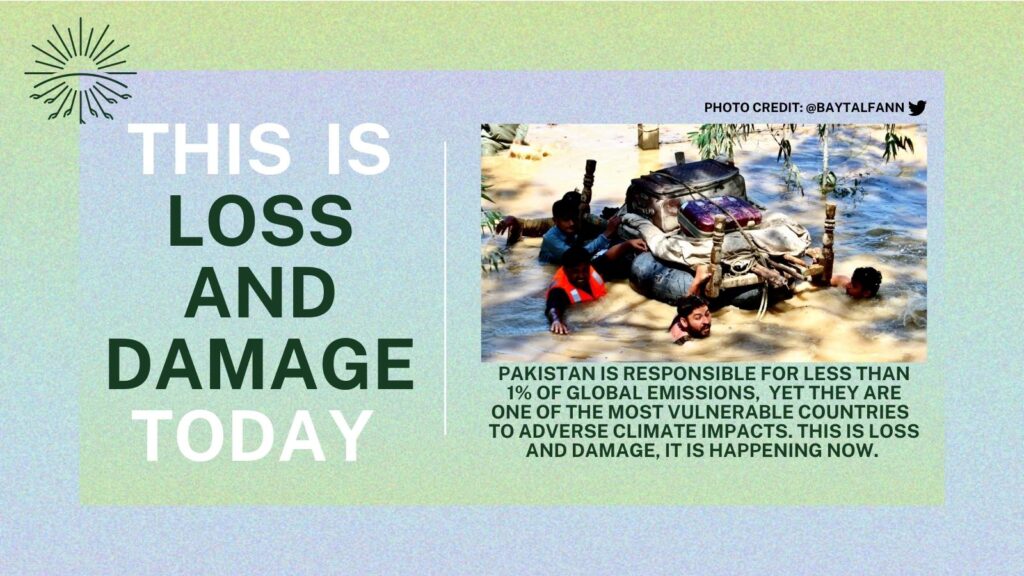The developing world shouldn’t have to cope with climate change on its own

By The ISNA Green Initiative Team
November/December
The 27th UN Climate Change Conference, more commonly referred to as COP27 (Conference of the Parties), will be held from Nov. 6-18, 2022, in Sharm El Sheikh, Egypt.
This year marks 30 years since the 1992 adoption of the UN Framework Convention on Climate Change (UNFCCC) and seven years after the 2015 Paris Climate Agreement at COP21. With the slogan “Together for implementation,” COP27 is billed as an “African COP” both for its location as well as the expectation that Africa’s exposure to some of climate change’s severest impacts will be front and center. As COP27 is taking place on African soil, amidst worsening impacts and unacceptable suffering, it will be a make-or-break event depending on how it responds to addressing loss and damage (L&D).
Under the Paris Climate Agreement, countries recognized the importance of “averting, minimizing and addressing loss and damage associated with the adverse effects of climate change, including extreme weather events and slow onset events.” L&D can be averted and minimized by curbing greenhouse gas emissions (mitigation) and taking preemptive action to protect communities from the consequences of climate change (adaptation).
Addressing L&D is the crucial third pillar of climate action: helping people after they have experienced climate-related impacts. These two issues, a long-running source of tension within UNFCCC negotiations, still have no agreed-upon definition.
At just over 1°C temperature increase, climate impacts are already causing significant L&D worldwide. The poorest countries, however, are being hit first and the hardest. Without sufficient action and support, more than a generation’s worth of human rights and development progress will be wiped out by climate-worsening impacts. As the largest historical emitter, the U.S. has a responsibility to respond to take action not just out of a charitable impulse, but in recognition of the harm done by decades of ongoing emissions.
L&D occurs when, due to either slow-onset or sudden events related to climate change, something is irreversibly lost and cannot be repaired or replaced (loss) or something has been broken and requires a financial investment to be repaired (damage). These include both financial and non-financial losses.
Examples include, but are not limited to, loss of life, income (e.g., destruction of crops by a cyclone or drought, land (e.g., rising sea levels or desertification) and culture (e.g., widespread climate displacement of communities) • homes damaged by hurricanes or fires and roads damaged by repeated flooding • loss of livelihood (e.g., fish species dying off due to ocean warming) • displacement and loss of homes (e.g., land erosion or mudslides related to sea level rise and/or severe storms) • indigenous communities’ loss of sacred land due to climate change • and loss of farmland due to climate change, especially for sustenance farmers.
Actions to mitigate these losses and damages with direct support must be provided to individuals and marginalized communities, not just to larger international institutions and governments.
We join climate justice voices with the following demands:
• Make L&D a permanent agenda item for future meetings of the COP and subsidiary bodies for every major UNFCCC meeting. These are held each year in May/June and November/December.
• A COP decision to operationalize the Santiago Network on L&D. This network’s vision is to catalyze the technical assistance of relevant organizations, bodies, networks and experts to implement the relevant approaches for averting, minimizing and addressing L&D at all levels in particularly vulnerable developing countries (Decision 2/CMA.2, para 43).
• Establish a robust financing L&D system within and beyond the UNFCCC.
• Adequate inclusion of L&D as part of the global stocktake, which occurs every five years, starting in 2023, and is intended to review progress toward the Paris Climate Agreement’s goals.
One reason why L&D has been so contentious is the developed countries’ concern that compensation caused by adverse climate impacts may be construed as an admission of legal liability and thereby trigger major litigation and compensation claims. As such, these countries fought to include language in the agreement to prevent them from being legally obliged to provide compensation.
However, finance for L&D should not be held back by such a debate. Developed countries should provide these funds not because of legal liability, but because supporting vulnerable countries facing unavoidable and existential threats from climate change is the right thing to do.
The ISNA Green Initiative Team would like Muslims in general and Muslim Americans in particular to raise their voices for compensation to individuals, communities and countries who suffer due to the excessive carbon emissions from the U.S. and other countries.
The ISNA Green Initiative Team comprises Huda Alkaff, Saffet Catovic, Nana Firman, Uzma Mirza and Saiyid Masroor Shah (chair)
Tell us what you thought by joining our Facebook community. You can also send comments and story pitches to [email protected]. Islamic Horizons does not publish unsolicited material.
